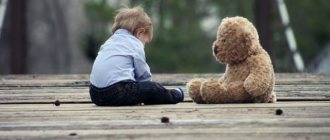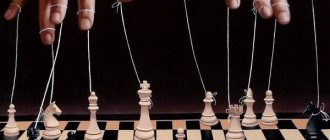Types of emotional abuse of children
Ignoring is the most cruel and dangerous attitude of adults towards little ones - not noticing, not talking. Children suffer especially sensitively from such punishment, because they, like air, need the warmth and tenderness of their parents’ hands, hugs and kisses, without this the personality does not develop.
Rejection - mom or dad openly demonstrate and do not hide from the child that he is unwanted, unnecessary, a burden and an unnecessary financial waste.
Isolation - in case of any mistake, put in a corner for several hours, locked in a room, not allowed to go out for a walk in the yard, not talk on the phone with friends, and so on, in fact, this is any restriction on freedom.
Intimidation and threats - “if you don’t learn your homework on time, if you don’t clean your room, you won’t watch TV, if you don’t go to visit, I’ll take away your mobile phone.” This refers to permanent psychological stress and pressure on the fragile consciousness of a growing person.
Humiliation - ridicule in public, in the presence of friends, insult with unworthy words. This also includes endless lectures and lectures about “unworthy” behavior, mockery, shouting and swearing. Often, offensive phrases and words hurt more than a slap on the top of the head.
I would really like to quote Pythagoras: “Do not make children shed tears too often, otherwise they will have nothing to shed over your grave.”
Any parent wants to see their “treasure” ideal - smart, beautiful, neat, healthy, kind. As soon as it is noticed that he is “not like that”, domestic violence begins. What is most surprising is that each of them wishes only the best for their beloved child, without even suspecting how their child is tormented and suffering. I believe that most adults have absolutely no idea about the trauma inflicted on the psyche and development of a person.
Violence experienced in childhood. How to overcome the consequences?
The main task when working through the trauma of violence experienced in childhood, if this trauma occurred in relationships with parents or other significant people, is to gain experience in non-violent relationships. That is, relationships where your personal boundaries are respected and “do not break” them.
In ordinary life, this is quite difficult to do, because... Our psyche is designed in such a way that we relive our unprocessed psychological traumas again and again. In addition, if you grew up in a violent family, then you most likely do not know how to build relationships in such a way that there is no violence in them.
You have a much greater chance of success if you work on yourself in personal therapy with a psychologist. If you do all this work together with a psychologist. Then you will have the opportunity in this therapeutic relationship to gain the experience of a non-violent relationship where your boundaries are treated with sufficient respect and care.
And this accumulated experience will help you in the future to notice and recognize people who are also respectful of your personal boundaries.
Why do parents do this?
There are several reasons, here are some of them:
— lack of knowledge, own negative experience;
- economic problems in the family;
— bad relationships between spouses, discord, misunderstanding (I write more about this in the article Violence in family relationships between spouses);
- social immaturity, irresponsibility;
- any chemical dependence - alcohol, drugs.
Emotional abuse is difficult to recognize, because there are no obvious visible signs in the form of bruises, abrasions and wounds on the body, so such pressure and pressure on children is considered the most insidious type of abuse, which interferes with the personal growth and healthy formation of children.
The psychotraumatic influence of violence against a child in the family leads to inhibition of intellectual development and adequate perception of the surrounding reality. He grows up to be easily vulnerable or, conversely, extremely aggressive. In any case, the capacity for self-esteem and self-confidence is underestimated. A person develops socially helpless, easily gets into conflict situations and is rejected by peers.
How children suppress memories of violence (and the dangers of doing so)
Children who have experienced abuse often repress memories of it. A defense mechanism is triggered that allows one to temporarily cope with the traumatic experience. But “suppress” does not mean “survive” and repressed memories always have their consequences. What they threaten, and how to help children become psychologically stronger, explains teacher and psychologist Irina Belyaeva.
Useful Mela newsletter twice a week: Tuesday and Friday
SUBSCRIBE
Why do we repress bad memories?
Freud was the first to speak about the phenomenon of psychogenic amnesia (repressed memories) as a type of psychological defense, an act of self-preservation. Unwanted, dangerous memories of trauma that a person is unable to recognize and accept can cause ongoing anxiety. Therefore, our subconscious censorship blocks them and does not allow them to enter consciousness. We are designed in such a way that the process of normal processing of our memory is ongoing, thanks to which everything that happens to us becomes a conscious experience, from which our personality is built. In case of severe or prolonged stress, stress hormones are released, their task is a kind of anti-shock therapy. They block the normal functioning of memory. They tell us: “Well, no, this situation is beyond your strength, let’s put it off for later.”
Sigmund Freud first spoke about the phenomenon of repressed memories.
Well, good, you say, they block and block. Defense! Of course, if we constantly remember and relive all our feelings and thoughts, we will drown. But the problem is that this does not mean that we no longer have such memories. They are repressed, but live in our subconscious for years, returning to us from time to time in different forms and at inopportune moments. They are like the sword of Damocles, which is ready to fall on our head in any stressful situation. We cannot comprehend, accept as part of our life experience what we do not remember.
What are the dangers of memory selectivity?
This selectivity of our memory, “I remember here, but I don’t remember here,” psychologists call dissociative disorder. It manifests itself in adulthood, but in most cases, up to 97-98% (as studies by American scientists at the end of the last century show) are rooted in childhood.
What are the dangers of such a disorder? Oh, there’s a whole bunch of possible diseases: from stomach problems, aggression, migraines to drug addiction and crime. The famous French psychologist Françoise Dolto, when asked where child delinquents come from, answers: “They were traumatized at an early age.” And if earlier such people could go on a crusade, sail to the New World, or go to war, now they join the ranks of alcoholics, drug addicts, or simply mentally unstable citizens.
If you ask children why a person became such a villain, you will often hear in response: “He was not loved and was beaten in childhood.”
How do they know this? We told them about it ourselves. Take a closer look at villains, real and imagined, from Hitler to Voldemort. Everyone had a terrible childhood. And scientists are inclined to agree with a phenomenon long described in fiction: unhappy children grow into bad adults.
Why are children at risk?
Children are primarily susceptible to this phenomenon; they are most prone to repressing memories. On the one hand, simply because they have fewer tools to process and accept experience. Well, how can you accept the fact that the adult you love, who is your whole world for you, on whom your physical existence depends, can hit you? Or systematically humiliate? On the other hand, children have a better developed imagination and it is easier for them than adults to create for themselves a fictional reality in which people are exactly as they should be - loving, understanding, accepting.
Children are most prone to repressing memories
According to statistics, amnesia most often develops in those who have experienced sexual, physical or long-term emotional abuse from parents or teachers. In adults, such problems most often arise among war veterans, people who survived concentration camps, terrorist attacks, and natural disasters. It turns out to be an excellent picture: not a single person in the world would wish for their child to end up in a concentration camp or witness a terrorist attack, but at the same time, many believe that physical punishment of children is a completely acceptable thing in education. Although, as statistics tell us, these situations affect the psyche in a similar way.
10 honest stories about domestic violence
Of course, there are a huge number of people who experienced violence in childhood and became completely harmonious individuals in adulthood, this is true. It is also true that children who have had a traumatic experience and who seem to have successfully dealt with it as adults experience stress much more severely than those whose childhood was uneventful. None of us are immune from disaster, loss or natural disaster. But those who were not beaten or humiliated in childhood have a much greater chance of growing up without a crippled psyche.
Children who have traumatic experiences and successfully cope with them grow into adults who experience stress with more severe consequences.
There is a common belief that “strict upbringing” toughens us and makes us stronger. Sometimes we even “raise a man” through systematic nagging, demands, or simply strive to send him to places where from infancy he learns the “harsh truth of life.” But violence in childhood becomes a time bomb that we plant in our children with our own hands.
Personal strength, readiness for change and challenges are based on three pillars: self-esteem, intelligence, basic trust in life
Physical and emotional abuse of a child is the main enemy of all these qualities. The stress of punishment does not allow our cognitive abilities to develop. The idea that you are so bad that even your parents reject you hits your self-esteem. The inability to influence events, the doom of punishment, undermines basic trust in life. If you want to raise a weak-willed, weak, dependent person, resort to spanking and insults more often. Works. Proven by psychologists. Only love makes us stronger, no matter how banal it may sound.
To prevent the physical body from getting sick, many different methods of prevention have been invented: vaccination, hygiene, hardening, healthy eating. With mental health, everything is less clear. There are no vaccinations or antibiotics. The mental health crisis is one of the global challenges facing humanity. And child abuse, unfortunately, is a problem that exists not only in the poor shacks of Africa, and it has recently been considered the root cause of the “repressed memory” syndrome. Yes, we don’t know everything about how to help people cope with this disorder, but we do know that by stopping the physical and emotional abuse of children, we will make the world a kinder place.
Photo: Wikimedia Commons, iStockphoto (chameleonseye, fiorigianluigi)
Cover image: iStockphoto/Archv
Signs of Emotional Child Abuse
- self-isolation, thoughtfulness, reluctance to share impressions and thoughts, aggressiveness;
- uncertainty in one’s actions;
- lack of communication, inability to communicate with peers;
- distrust of others, including loved ones;
- inability to show feelings for other people, indifference, lack of empathy;
- unjustified capriciousness in order to attract attention to oneself;
- sleep and appetite disturbances;
- far-fetched fears;
- frequent illnesses.
As soon as parents notice these symptoms, they should urgently “clean up” the educational process and draw appropriate conclusions.
What should parents do?
“The best way to make children good is to make them happy” Oscar Wilde. Wonderful, smart, healthy and developed children in every sense of the word grow up only in love. A child should be loved not because he is neat, calm, beautiful, flexible, and so on, but because he is! Of course, there is no education without punishment, but you need to correctly and competently guide your blood through life. Warn about dangers, talk about all the topics that concern him, and not refer to being busy. Share your own impressions and opinions, suggest what to do in a given situation. Allow him to make his own mistakes, otherwise his character will not develop, do not shut his mouth and, especially, do not yell or put pressure on him with authority. This does not mean being on an equal footing and indulging in every whim. This means recognizing the dignity and importance of a little person, respecting him and accepting him for who he is, slightly and unobtrusively correcting some shortcomings that are likely to hinder him in later life.










